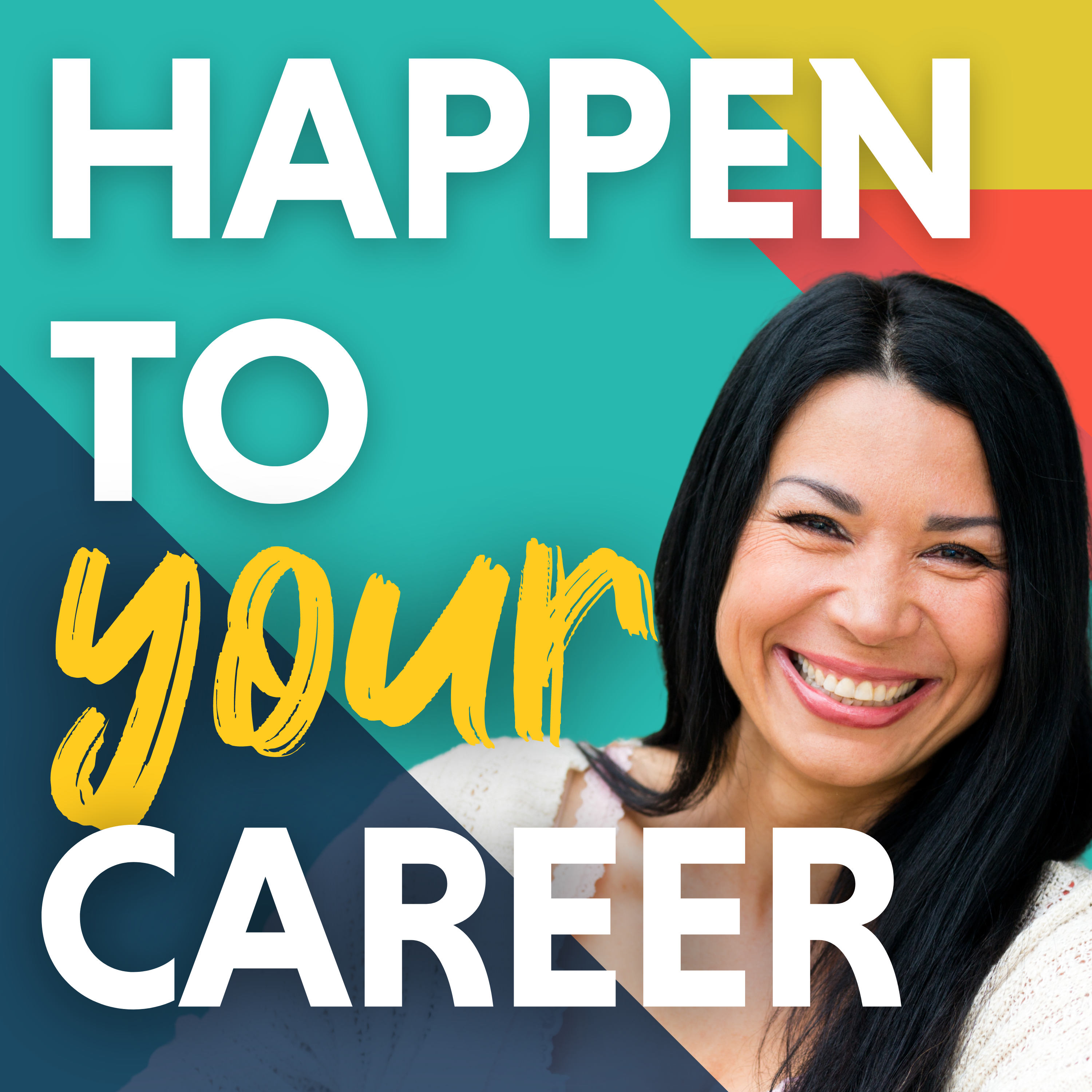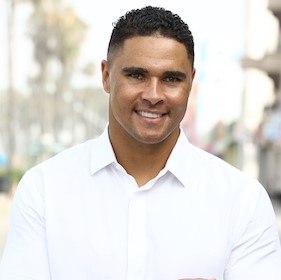Listen
Guest
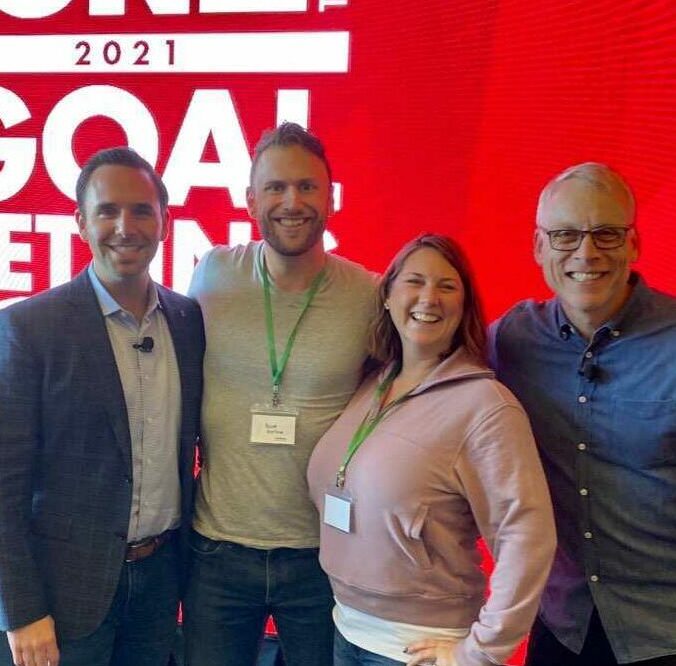
Scott & Alyssa Barlow, CEO & COO of HTYC
Scott & Alyssa are a husband and wife team who started HTYC together, in an effort to help others make successful career changes to work they love. They are both self-development nerds, parents, and love of travel as much as possible.
on this episode
Every single year my wife Alyssa and I sit down to pencil out our goals for the next year. But this year we sat in a hot tub in Austin Texas.
Ok let me explain. We’ve done goal setting for over 13 years now, but funny thing…we’ve hit almost all of our goals. That sounds like a good thing right? Well it felt like a good thing, until recently. we started realizing that maybe we’re thinking way too small. Maybe we could be making a much larger impact for ourselves, our clients, our team members and our family and friends.
Now for the last few years in a row we’ve shared on the podcast exactly what we’ve learned from setting goals as a couple for over a decade. Check out episode 386 if you’re interested in seeing the progression.
This year we decided we wanted some outside help to break through our own mental limitations that we suspected we were placing on ourselves.
Now I don’t consider myself as someone who thinks small and I acknowledge that we’ve done many things that our friends tell us seem impossible, but I had no idea just how small I was thinking. That is until we went to attend the One Thing Goal Setting conference in Austin Texas. If you’re not familiar with “The One Thing”, it’s a book by Gary Keller and Jay Papasan. I met Jay when he came on the podcast back in 2017. He now co-owns a company by the same name with a long time friend Geoff Woods.
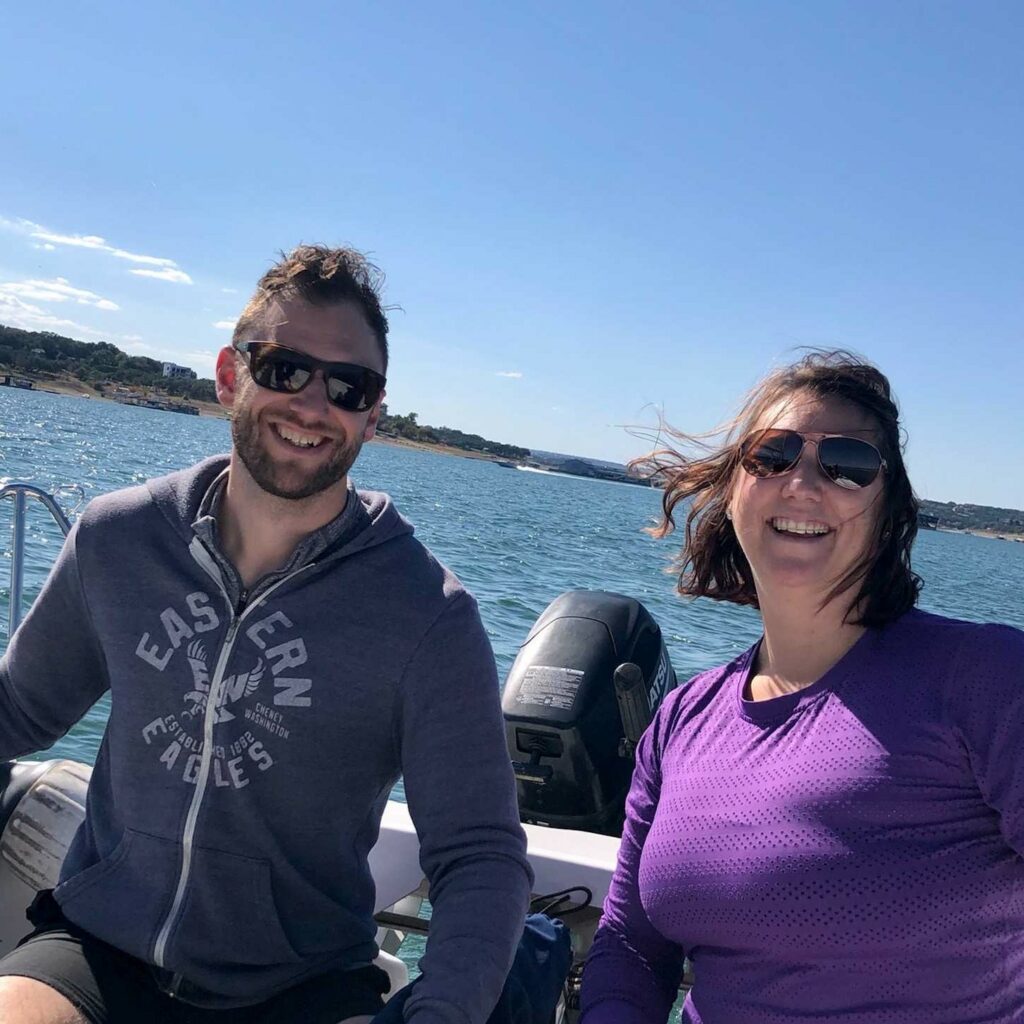
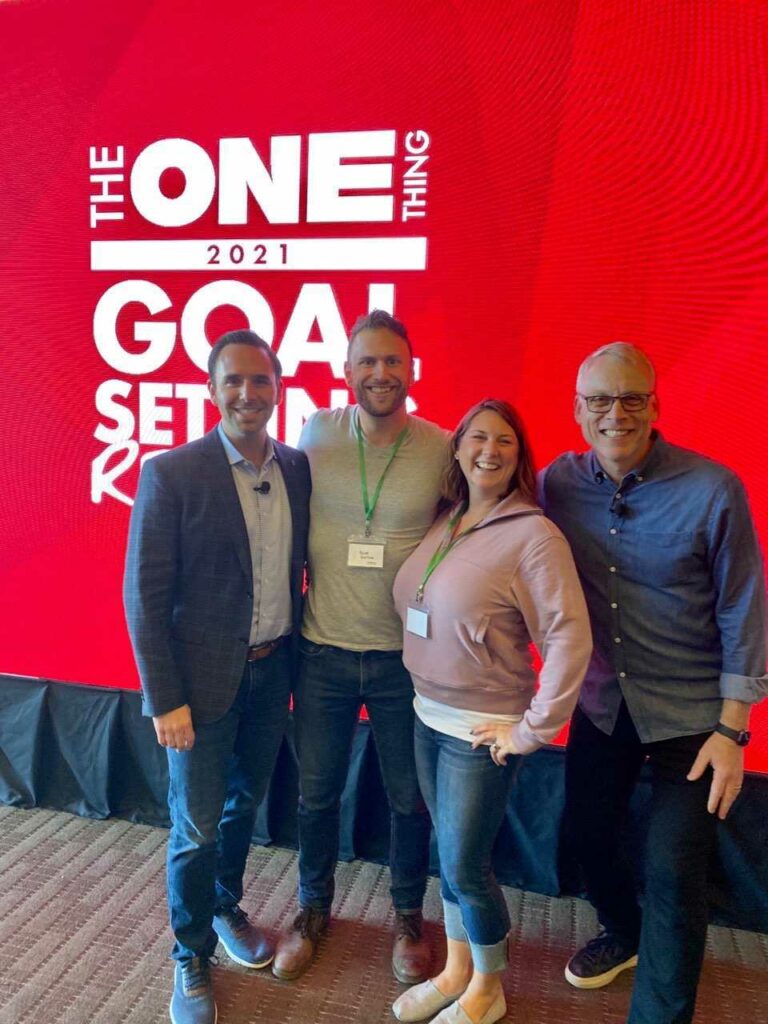
Alyssa Barlow 00:02
And I think in the past, I've always felt like, "Oh, we have to have financial goals, and we have to have health goals. And we have to have spiritual goals. And we have to have goals for the kids. And we have to have the goal for this and the goal for that." And this year, I really felt like I was able to narrow that focus and just think, one, what's the one thing I want to change this year?
Introduction 00:28
This is the Happen To Your Career podcast, with Scott Anthony Barlow. We help you stop doing work that doesn't fit you, figure out what does and make it happen. We help you define the work that's unapologetically you, and then go get it. If you're ready to make a change, keep listening. Here's Scott. Here's Scott. Here's Scott.
Scott Anthony Barlow 00:52
Every single year, my wife, Alyssa, and I sit down to pencil out our goals for the next year. But this year, we sat in the hot tub in Austin, Texas. Okay, let me explain. We've done goal setting now for about 13 years. But funny thing, we've hit almost all of our goals. This sounds like a good thing, well, it felt like a good thing until very recently. We started realizing maybe we were thinking way too small. Maybe we could be making a larger impact for ourselves, our clients, our team members, our family or friends. And now, for the last few years in a row, we've actually shared on the podcast exactly what we've learned from setting goals as a couple for at this point over a decade. Check out episode 386 if you're interested in seeing the progression in last year's. This year though, we decided we wanted some outside help to break through our own mental limitations that we suspected we were placing on ourselves. Now I don't really consider myself as someone who thinks small. And I acknowledge also that we've done many things that our friends tell us seem impossible, but I really had no idea just how small I was thinking. That is until we went to attend 'The One Thing' goal setting conference in Austin, Texas. By the way, if you're not familiar with 'The One Thing', it's a book by Gary Keller and Jay Papasan. And I met Jay when he came on the podcast back in 2017. He now co-owns a company by the same name, 'The One Thing', with a longtime friend Jeff Woods. Today, I bring on a special guest, back on the podcast, my wife, and also our CFO of our company Happen To Your Career, Alyssa Barlow. Welcome back to the podcast.
Alyssa Barlow 02:47
Thank you.
Scott Anthony Barlow 02:48
Okay, I'm excited to do this again. Last year, we went through "What were some of the top three things that we've learned from a goal setting for many years. And what worked really well, as a couple? And what hasn't worked over the last few years?" This year, we have a different objective, though. This year, we want to talk about a few different things. We're going to cover what changed about how we've thought about goal setting for this year, and then maybe also over the years. And then we're going to share our three biggest takeaways from this year, going to Austin Texas, doing goal setting with a... not by yourself anymore, but we're actually, you know, getting help with that. And then, what was most beneficial about getting way out of the ordinary to be able to set goals? So I am super curious, I have my own thoughts here. But for you, when you think about this year, in particular, what do you feel like has changed about how you view setting goals?
Alyssa Barlow 03:59
I think traditionally, I am not the big thinker in the relationship. And so it's a little more difficult for me to think about things in a big way. I traditionally like the linear steps to getting to the things we're thinking about. But like you said, after reaching our goals for year after year, I kind of started wondering like, well, if we're hitting all these goals, sometimes hitting them, you know, three, six months into the year and then having to come up with new things that we want to strive for, that maybe we weren't setting them big enough in the first place that maybe we could achieve more if we started looking bigger earlier.
Scott Anthony Barlow 04:44
Now, hold on. So you said achieve more and I think that both you and I would probably describe ourselves as achievers, right. Can I ask you about that, like, what that means for you as an achiever? How do you think about that?
Alyssa Barlow 05:01
Well, I mean, I like to check the boxes. I love to make to-do lists and checkboxes off. I think you're right, like, I definitely am an achiever. It feels good to be able to check boxes and say it's done. But when you're checking all the boxes, and it's done early, it's a great feeling but then it made me start wondering if maybe there could be more boxes to check or bigger boxes to check.
Scott Anthony Barlow 05:25
I think that's definitely something I resonate with, too, I enjoy hitting the goal. I mean, I also enjoy the process. And I've learned to enjoy the process over the years. I haven't always enjoyed the process, honestly. But the checking that box and wanting to check that box definitely feels very, very good. You know, I think that for me this year, one of the biggest things that changed in how I view goal setting is that if we're setting far larger goals, far, far, far larger goals, we've chosen to set some really, really, really aggressive goals. And this year, we're looking much, much further ahead to, you know, we looked at 20 plus years ahead in the future. And I would say that's one thing that was different for me. We've done that sometime, looked far ahead, but we haven't done that every single year with every goal. So that was one major difference for me. But I think the challenge there that I experienced is this idea of being okay if we don't entirely hit the goal. And what I mean by that is that if we're setting our goals large enough, and if especially if we're setting them across multiple years, really, I mean, everything that we set this year, supports our longer term goals, and is very meaningful to us or very emotionally connected to it, you know, for example, you know, I really very, very much want to be around not just for our grandkids, but I very much want to be around and still be in a high quality of health for... to be able to see their kids, and you know, have this goal where, particularly for our grandkids, I want to be there to like run up the stairs with them, and I want to be there to, like actively play with them and have it just be no big deal because I'm in really, really great quality of health. And, you know, on a smaller scale this year, there's things that I can do to support that goal, but the challenge for me is really trying to be okay with... if we've got these really, really aggressive goals. Because for me, that means that I am setting up to live well past 100, in fact, I've set my goal, I really want to burst through 120 and be able to live till 140. And I think we're reaching a time in which that's very possible. And that sounds really aggressive for so many different reasons. And regardless about how you feel about that, I think that the challenge here is whether we're talking about health, or whether we're talking about, like, you know, a monetary goal. I'm still reconciling with being okay with not reaching the year to year goals, because we've checked so many boxes in so many past years, and it feels so good. And I think that we're shortchanging ourselves. So I'm curious, how do you feel about that? Like, you and I had a conversation about... I don't think you were totally okay with it either, but share with me what you feel about that?
Alyssa Barlow 08:47
I think the what... in this particular framework that we use this year to set goals, I think what was helpful to me was that the end goal didn't necessarily have a time date attached to it. 'The One Thing' framework for goal setting, your largest goal that you set, they call it a someday goal. So I mean, you may have in mind, you want that in 10 years, 20 years, 40 years, but it doesn't necessarily have a specific end date attached to it. It's someday. Someday you're achieving for that. And then you work backwards from there, which helps me because I am that linear thinker, I want the boxes to check along the path. I want to know how I'm working towards it. So for me to think way someday in the future, I could think and dream about things that I want to see someday in the future, and then back them down to what that could look like in 10 years, 5 years, 1 year, and what do I need to do this year in order to start moving towards that. I think for me, that was the big thing. It was a movement towards that not necessarily completing it. It was just the movement forward.
Scott Anthony Barlow 09:59
And I think that's a really great point. Because if you learn to focus on the movement, like, that does so many things, first of all, like, it allows us to be able to spread far larger goals across many, many years. But also, I mean, the cliche, enjoy the journey, right? If we're focused on the movement, that really is synonymous with the journey in so many different ways. And I think that that is a... how shall I say it, I think that that is something that... as I become more and more okay with it, and I still don't know that I'm completely okay with it, I think I am still reconciling with that in many different ways. However, as I become more and more okay with that, it allows being able to be content with where I am, while simultaneously striving to improve and go after the, you know, the impacts and the things that I want, and we want, it allows for them to coexist. And that's something that... geez, especially if you go back, I don't know, 7, 8, 9, 10 years ago, that's been a huge struggle for me. It felt like those can't coexist in so many different ways. So let's talk about takeaways, then, your biggest takeaways. What was your third biggest takeaway, we'll say?
Alyssa Barlow 11:27
I think that along those same lines because I'm an achiever, traditionally, in the past it's been difficult for me to quote unquote "fail", I guess, at things. And so when you're setting huge goals way out in the future, it can be daunting to think that you might fail on that goal, but like we were just talking about, it's more about the movement or the journey forward. I don't know if it was my third biggest takeaway or not, but a large takeaway that I had coming out of the weekend, just being around so many other people, one, hearing the other people have that fear as well, that fear of failure, and that it's really daunting to do that. But I think the takeaway from that was that, in order to... it's almost a cultural thing, like, there were so many people they're talking about that it was like, "Oh, that's like a cultural thing. I thought it was a me thing that I was just afraid to fail." So for me, the impact was how can we change our children, so that they don't also have that cultural feeling of failure of not wanting to journey forward, because they're afraid they can't make it to the end.
Scott Anthony Barlow 12:38
That topic right there. Like, we had a lot of tears, overall. Like, this was a highly emotional opportunity in time, I would say, for us, because the things that we were focused on mattered and what you said right there about, it's not just wanting to change this pattern of how we view this for us, but recognizing that, one, if we don't change it for us, it's gonna be difficult to change it for our kids. And we really both, I think, feel very strongly that we want our kids to be able to have a growth mindset as they grow up, not look at failure in the exact same way that we do, and we want to be able to impact that. And, you know, that was definitely one of my takeaways, too, you mentioned, you know, setting our sights higher, and some of what is associated with that, like, I kept finding, as we were focused on, you know, "What do we want to accomplish in this area? What do we want to accomplish with our finances someday? What do we want to accomplish with our business, Happen To Your Career, someday? What do we want to accomplish with our important relationships, like, your and my relationship someday?" As we were going through those, I kept finding that what I would write down was probably less tool for 10 or 20 years in the future, where we wanted to target. And then after I would write it down and start working backwards, realize this is actually more like, three years or five years. And it's like, wow, I kept bumping into that limitation that I didn't realize I was placing on myself where I just couldn't even imagine in some of those areas, what extraordinary could look like? And that's another thing that I took away too. What would extraordinary look like? You know, we use... here at Happen To Your Career, we use the terminology, "what would ideal look like?" all the time and variations of that question, but for some reason, extraordinary, just felt different to me, maybe because it was just a new work, maybe it was word semantics. However, you know, that felt different to me and really evaluating like, what would just, kind of, beyond, you know, my wildest dreams in each respective area? What would that look like? What could that feel like? What could that be? What are the possibilities? And that was a huge takeaway for me, just evaluating that and practicing that at a larger scale. And I recognize this was my second takeaway, like, what extraordinary looks like is really something that you have to practice? It's harder than it seems to sit down and really evaluate what that could be and what it could look like. What was another one of your takeaways?
Alyssa Barlow 15:45
I think, another one of my takeaways, which also kind of leads into the next question about getting away to do this, but because I have traditionally struggled with thinking bigger in the past, being surrounded by a community of people who were doing the same thing, obviously, we weren't all setting the same goals. However, everyone in the room was setting big goals, 20 year goals, 30 year goals, 40 year goals. Someday, in the future, when you don't even know you're gonna reach it, and these are big, big goals, and then all of a sudden becomes... I don't want to say easier, but it allows you to think differently when you're in an entire room or community of people who are also thinking in that same way.
Scott Anthony Barlow 16:37
Yeah, I can definitely agree with that. And it was... I don't even want to put it. You talked about the community, it felt like it almost was okay to do that. I think when I have a conversation with people on the street sometimes or just like, just meet people, I don't know, here in Moses, Lake Washington, Moses Lake is a pretty rural community, I would say it's a fairly conservative community. Like many times, I find myself explaining what a podcast is to people that I meet here, you know, in and about and around town, like, obviously, you all know what a podcast is. However, there's a lot of people in Moses Lake that don't really know, right, so if that gives you any sense of, you know, kind of the general vibe of the community that we live in, and we love it for so many different reasons. However, I would say that, you know, growth mindset is not popular in Moses Lake in many different ways. That said, though, being in that community of people, it felt like it made it okay to release what really wanted and sort of gave permission, for lack of a better phrase, to be able to go bigger than what was thought possible. And that was really, really cool, that felt really, really special. You know, my other takeaway, my biggest takeaway was that focus on someday. You mentioned it earlier, I mentioned it earlier, but that was my biggest takeaway. Instead of really placing emphasis on the number of years, I think the idea of someday focusing on, "What do I want to achieve 'someday'? What do I want to do? Who I want to be 'someday'?" releases a lot of the qualifications that we place on ourselves. Because, as I think about, you know what I really want, a lot of times, I am not even realizing that I'm saying, "Well, I can only do that if this happens" or "I don't know if that's really possible because of these other things." And instead, 'someday' releases a lot of the pressures that I don't even know that I'm putting on myself. So, especially, what usually is attached to like, if I'm focusing on specifically 10 years out, or 20 years out, or 30 years out. So starting with, "What do I want someday? Who do I want to impact someday? How do I want to be someday?" is just so much more powerful, and it saved a lot of time and effort, I guess I would say. What about you, what was your last takeaway?
Alyssa Barlow 19:27
I think the last takeaway for me was the part of goal setting. Most people think about setting your financial goals for the year or, you know, much more a health goal or something that's very specific, I guess, very measurable, very action oriented, you know, you can write down specific actions to go with it. But I think like Scott was saying with that word, extraordinary and someday, words like that are not measurable and actionable words. They're much more, I don't know what the right word is...
Scott Anthony Barlow 20:09
They're softer, they're more intangible for sure.
Alyssa Barlow 20:12
Yeah. So thinking about it in that way, allowed me to think about myself, actually. And one of the exercises they had us do was to try and define core values. And that was very difficult for me. Super hard for me to think about what my core values were. But when I finally got to a place where I identified some choices for my core values, and so 100% sure if I have all of them yet, but it allowed me to think about goals around that, as well, not just the super easy, actionable exercise goals, or monetary goals. And one of them for me was parenting, actually. So being able to think about, how can I set a goal around being a better parent? That was huge for me.
Scott Anthony Barlow 21:02
I think that, you know, just like you mentioned, for your values, I think there's something that I saw for you is that, you know, I don't think you'd ever really considered parenting to be something that you value so highly, at all, in many different ways. And I think that gave you the ability to look at it differently. And I think that was really fascinating to be able to see that in action. And I think that allowed you to be able to set goals around it since it is something that is important to you, highly important to you, in a completely different way. And something that I wanted to, I don't know that you and I have discussed this fully since we got back, however, I'm curious about, what are your thoughts about getting away to do this? Because we've, in past years, you know, we might have taken part of a day, and we might have, you know, got a babysitter for the kids or had you're... taking them over to your mom's or any number of other things. And then we would go and set goals, we might go to Starbucks, might go someplace else, but this might be the first time where we've ever taken five days and gone away. Now, in fairness, this is also... this time of year is in conjunction with our anniversary, we've now been together for 22 years, and married for 17. And, you know, both of those anniversary dates happened in November. So there was another reason for us to get away. But I'm curious, from your perspective, Alyssa, what made it beneficial to get away? If it was beneficial. How do you think about that?
Alyssa Barlow 22:51
I definitely think it was beneficial. Yes. Especially since we were looking at goal setting from a different mindset in a different place this year. I think it was really, I think that was really helpful that we were in a totally different mindset in a totally different place in order to think about it in a new way. I think the other thing about getting away, that was nice, in the past, like Scott said, we've done, you know, just like a half a day here or maybe a full day even, I guess maybe one time we did an overnight. But having... being somewhere where we were away and had to travel home actually gave a little bit of time to decompress after the goal setting. So it wasn't just like, "Okay, go go go, we have to write all these goals down, we have to figure out how we're going to do all of this, make sure you got when it's all going to be done by, and now we have to go pick up the kids." It was... we actually had time to talk about things and especially when, you know, we were using a new framework this year, that was totally different for us, we were thinking in a totally different way, we needed that time and space to be able to talk to each other about it, sit on it, go back to it, talk about it again and then be able to actually, you know, formalize something out of it. So the time for that was huge, I feel like. And other thing, 'The One Thing' talks about the goal setting, specifically, they call it "your bunker". So creating a bunker room where there's no distractions, there's no, you know, you're not thinking about the dishes, you're not thinking about the laundry, you're not thinking about picking up the kids, I think that for me was big. I didn't have to think about, "Okay, we have to be back to pick them up at a certain time." Or, you know, are we burdening somebody else because they're keeping them. I mean, this was all pre arranged, everything was set up, we were gone, we knew exactly when we would be home, so I think for me just creating that space around not having to stress about, "Okay, we're running out of time or we're not going to get this finished or we're not going to have time to talk about it later." just having that space to do that in.
Scott Anthony Barlow 25:02
That's really interesting. That's the same thing when we were talking about recording this. We each wrote down some different answers to these questions. I didn't see your answers, you didn't see mine but that's the same thing that I wrote down, too, that creating that space was so huge, I think that really made it, because not only did it create the space for... to not have to worry about all the things that normally just would distract us, but I think the other thing is, we really needed to spread it across multiple days. And, you know, as you're listening to this, maybe you don't need that same thing, I don't really know, but for us, that was absolutely huge. I think that's really what made it for us. And we have, sort of, spread it across multiple days in the past. And the way that we've done that in past years would be that we'd meet, initially, during November, we might meet another time to kind of reassess, and then we would finalize our goals on January 1st. And this year, I definitely enjoyed it so much better. I thought it was so much more effective for us, personally, because not only did it create the space in the way that you described it, Alyssa, but also I think, for both of us, it gave us the space to fight through the mental blocks and mental barriers that came up that I did not expect to that level at all, like, maybe I should have, but I did not at all. And also, I think being away out of town in a totally literally separate space, in a separate state in our case, it sort of forced us into a situation in which, like, we have to figure this out. Because I think day one, both you and I felt like, "Oh my goodness, like this is... we're barely into this, like we're barely... how are we going to pull this together in another day or two, in a way that is useful for the whole rest of the year and beyond?" And it definitely felt, at that point in time, like, wow, we're not making any kind of progress whatsoever. And as it turns out, you know, being able to just ask the questions that we were asking at the time, "What is extraordinary look like? You know, what do we actually want in each one of these areas? And what would that look like if we went beyond that in allowing to sit with those questions?" I mean, I know fundamentally, like that's a good thing to be able to do is provide space to consider, like, we do that all the time with clients. I didn't realize how much of an impact that would be for us, and it was a reminder of just how big of ideal that can be. Because the answers usually don't come right away, but it's the act of considering the questions and fighting through all the barriers that stop us from answering those questions that really, really are maybe even, in some cases, harder than accomplishing some of those goals themselves. That was really revealing and a great reminder to me. Here's what I would ask, it's a last question for you Alyssa. You know, what advice would you give... What advice would you give to someone who is just getting started with goal setting or just getting started as a couple with goal setting? What advice would you give to those people?
Alyssa Barlow 28:34
Definitely, no matter where you're at in a goal setting journey, where you've been doing it in the past, or whether you're just thinking, you know, "now's the time, I need to start setting some goals." find your community, find other people, you know, who are like minded, who are thinking in the same way as you, or even other people who have done it before because they can give you insights into the steps to move forward. Or you know, if you've been doing it for a while, how to change your thinking a little bit. That's how we, you know, I say stumbled upon this conference, really, because we had been planning a trip anyway for anniversary. And then it just, it was the right time, and the right place. Scott got the email about it. And I was like, "Oh, yeah, I think we do need to do something different this year. And let's just go for it." So finding that community, finding those people, finding ways to talk to other people about it. I really think that we had thought, you know, "Oh, we're doing so good. We're writing all these goals down every year and we're achieving our goals and we're doing so awesome" But then, you know, at some point, you realize there's more out there and you got to find a community to help you continue getting that more that's out there.
Scott Anthony Barlow 29:49
That's awesome. I checkmark next to all of that for me too. And the only thing that I would add to that would be that, as your... we've been doing this in various capacities for now 13 years. And when we started, it was far different. I think we were arguing about it, is probably that's... that looks very different from now, I think, we were definitely not on the same page, we didn't feel it was okay to want different things, I think we felt like, and, you know what, we were talking about this the other day, like, at the beginning, it really felt like we had to want the same things. And we had to just like, force that together so that we could, you know, feel unified and work on it. And I don't think we were totally okay with that, we can... some things we're gonna accomplish together, and some things we are... we want just being different people. And my advice to you would be, if you're doing this with a partner, then, you know, allow for it to be okay that you're doing it imperfectly. It's more important to practice it and get someplace. Someplace in terms of, being able to go through any kind of goal setting process, whatever that looks like for you. And just practice being able to declare to each other what is important to you, you know, even if the first year, that goal never gets hit, even if the first year, you know, it is just that type of conversation. If that's where you're starting, I think that's okay. I think it really, really is. It has to be imperfect, because it doesn't lead to everything else until you go through those types of conversations. And then for those people that, you know, for those people who have been, maybe you've been goal setting for many years, I would challenge you to think, "What could someday look like for you? What could ideal look like for you? What could extraordinary look like for you? And how could that be, you know, more than what you have limited yourself to in so many different ways?" because the one thing that I have found over and over again, is that, you know, as you do more, and you become a different person, and you are achieving more, the really wonderful thing is that you get to share that with other people, you get to share that with your family, you get to share that with your friends, you get to share that with the people that you work with and impact on a daily basis. It isn't just about you, even if some of those goals are set for you, and allowing you to improve in areas that are important to you, it impacts so many other people in the world. So my advice to you would definitely be, look much larger outside yourself. Alyssa, any final parting thoughts?
Alyssa Barlow 32:53
I think the only other piece of advice that I would give, and this is a new piece of advice for me, too, I guess this probably could have gotten in the takeaways as well, but, you don't have to have a goal in every area of your life or, you know, trying to work towards 18 goals this year. I mean, if you even only have one goal, and that was the big thing, you know, obviously it's called 'The One Thing', but, you know, we left the conference with them saying at the end, "One, what's one thing that would change your whole year?" And I think in the past, I've always felt like, "Oh, we have to have financial goals, and we have to have health goals, and we have to have spiritual goals, and we have to have goals for the kids, and we have to have the goal for this and the goal for that." And this year, I really felt like I was able to narrow that focus and just think, "One, what's the one thing I want to change this year?"
Scott Anthony Barlow 33:53
Yeah, I love that. I love that. And that, I didn't mention it earlier either but that was a huge takeaway for me, too, because I think I have forced it. And honestly, some of those are more important than others. Like when you start to prioritize and rank and I mean, again, sometimes I feel like I'm relearning that particular lesson because we literally do that all the time with our clients, we do that all the time for, you know, the people that we serve. And it's true, unless you are focused on less than... it's not going to lead to more in many different ways. And a lot of the times that can really be like, "Hey, what is the one thing that is going to be impacting everything else?" And that's it. That's your lead. Hey, Alyssa, thank you very, very much for making the time. And I know that we've done this the last couple of years but I really really appreciate the opportunity to just sit down with you and talk about this. Like I really legitimately enjoy this and being able to share it with other people. And I know you and I have had many conversations but even a couple of the questions here, we hadn't talked about in the same way. So I really appreciate that very much.
Alyssa Barlow 35:18
Thank you for having me. And it's always a joy to share.
Scott Anthony Barlow 35:23
Hey, I would also encourage you, as you're listening to this, to definitely, for sure, think bigger. But I'd also invite you, too, at the same time, you know, if you have goals that are important to you around your career, or you want to set goals that are important to you around your career, and you want that to be the thing this upcoming year, as you go into 2022, and you wanna really want to get ahead on that, drop me an email personally, scott@happentoyourcareer.com and just go ahead and put 'Goals 2022' in the subject line. And what we'll do is either my team or I, we will get that email, we will introduce you to our team, probably Cindy on our team, or Phillip and we'll have a conversation with you and learn about your situation, what you want to accomplish, what you know about what you want to accomplish, what you have yet to figure out, and figure out the very, very best way that we can support you in doing that, and help you make it happen for this year, this upcoming year. So again, just drop me an email scott@happentoyourcareer.com put 'Goals 2022' in the subject line, and then we'll make sure that you're well taken care of. I'm so looking forward to supporting you for anything that is really, really, really up there, really, really important to you in this upcoming year. Hey, appreciate your listening. And if there's anything else you need, you know where to find us. Until next week, we'll talk to you later. I am out.
Sign up to receive email updates
Enter your name and email address below and I'll send you periodic updates about the podcast.

Ready for Career Happiness?
What Career Fits You?
Finally figure out what you should be doing for work
Join our 8-day “Mini-Course” to figure it out. It’s free!
Featured Episodes
View all episodes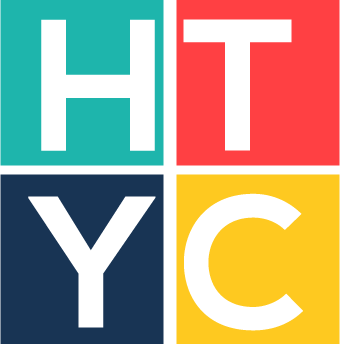
April 17, 2017
174: Add Value, Grow Your Career with Michael Bigelow
IT’S ONE OF THOSE THINGS THAT THE LIKABILITY AND CONNECTION CERTAINLY DO HELP. BUT IT’S ONE OF THOSE THINGS THAT I REALLY DO FEEL THAT IT’S BOTH WHO YOU KNOW AND HOW YOU’RE CONNECTED TO THEM, AS WELL AS WHAT YOU KNOW. MICHAEL BIGELOW Whether you’re looking to make a lateral job transition to a […]
Listen Now

January 21, 2019
267: 3 Creative and Strategic Ways to Show Your Strengths to Interviewers
Everywhere you look these days, you can find articles sharing why focusing on your strengths is more valuable than improving your weaknesses. Using your signature strengths in your role means you can be energized instead of drained, engaged instead of bored, and successful instead of struggling. When it comes down to it, working in your […]
Listen Now
